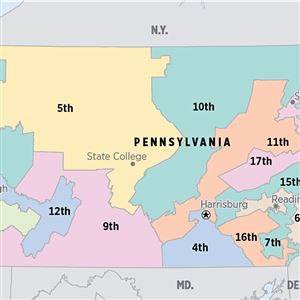Jane C. Sherburne is principal of Sherburne PLLC. Nathan Owen Rosenberg is founding partner of Insigniam. Robert J. Kueppers is former vice chairman and deputy CEO of Deloitte LLP. All serve on the Money in Politics Subcommittee of the Conference Board’s Committee for Economic Development. The board is a global, independent business membership and research organization.
•
The U.S. Supreme Court has spoken on Pennsylvania’s gerrymandered voting districts by upholding the state Supreme Court’s ruling, but solving the epidemic of extreme partisan map drawing will take much more than court decisions. If we want fair, competitive elections in which our votes actually matter, the time to demand serious reforms is now.
The practice of manipulating legislative district lines to achieve a political advantage has increasingly put citizens in an inverted role, by which politicians choose their voters instead of vice versa. The two major political parties are the ones calling the shots, having achieved a distinctly un-democratic duopoly over how legislative districts are drawn and thus how elections are decided.
In most states, legislators have the power to establish their own districts, and both parties work to gain the majority needed to control the process and create favorable districts that often entrench incumbents and diminish the power of voters to change their leaders. The parties are engaged in a perpetual, expensive tug of war, with voters as the rope.
The political class can rightly claim that gerrymandering is as old as American politics itself, but few of its members will admit that recently developed capacity to refine district manipulation is dangerous and has made reform essential.
Thanks to the tools that technology has made available to legislative mapmakers, it is easier to predict voting patterns, then draw districts that largely predetermine election outcomes. Partisan gerrymandering is therefore more common, more efficient and more effective than ever before. This is helpful to political operatives, but the broader consequences are putting the fundamentals of American democracy in peril.
District maps that produce uncompetitive seats (more than 75 percent of current congressional districts, which are home to 85 percent of the nation’s eligible voters) discourage voting and undermines the principle of “one person, one vote.” Voters have become a means to an end, no longer playing their intended role of empowered citizens who are responsible for electoral outcomes.
Partisan districts also push political competition down from general elections toward primary contests, which encourages both sub-par and extreme candidates because winning a primary is tantamount to winning the general election in a gerrymandered district. This phenomenon compounds the partisan polarization that is so evident in Congress and state legislatures, and it makes politically moderate candidates the endangered species of our democracy.
Purely partisan efforts to control the drawing of state and federal voting maps will never result in a fair shake for voters. This battle is begging for a new view from the nonpartisan — or, better yet, nonpolitical — center.
Redistricting should should remain at the state level, but it should be in the hands of nonpartisan, independent commissions, not elected partisan politicians, that are charged with applying the neutral criteria needed to draw fair, competitive district lines.
We also must recognize the importance of an accurate and fair census of the American people, which is the basis for redistricting and representation in our political system. At present, the quality of the 2020 census is threatened by budget stalemates in Washington and the White House’s failure to nominate a Census Bureau director. Congress and the administration need to act quickly to ensure funding and staffing commensurate with the task.
Judges and justices cannot solve the broader problem represented by extreme gerrymandering. The two major political parties have little incentive to give up their duopoly over redistricting, so it is incumbent on citizens and leaders in the private sector to demand that districts be drawn by nonpartisan, independent commissions. Fair district lines will re-inject competition into our political process and put voters back in charge of choosing our leaders.
First Published: March 23, 2018, 4:00 a.m.
















